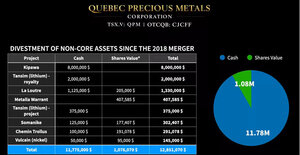
Some alternative silver investments offer even more leverage than mining shares, according to expert David Morgan. In the fifth and final chapter of our "Guide to Silver Investing," David discusses the risk, reward and reality of futures and other alternative investments. Read on. . .
Leveraged Silver Investments
As if mining stocks did not provide enough leverage, there are still other avenues that offer even more leverage than mining shares. The decision to use leverage in a precious metals purchase is a decision to accept a greater percentage of risk relative to your capital outlay.
The potential is for an increased opportunity to earn a greater percentage of profit. The use of leverage should match your risk ability, both from a financial and psychological point of view. The increased risk in using leverage is not worth it for most people.
It is my opinion that more damage has been done to the precious metals markets, and in particular silver, by the use of leverage than any other factor. This statement cannot be proven and again, is opinion; however, let us look at a typical scenario that has been repeated thousand upon thousands of times over the past quarter century.
A novice will do some preliminary research or reading and discover that silver has a supply-demand relationship that is very favorable. Using this "knowledge," silver seems like a "no-brainer" and this eager novice decides to use all the leverage available.
This fledgling investor opens a futures account, puts in the minimum margin required by the broker, goes "long" or buys silver on margin and, within a very short time, is wiped out. At that point this novice does not take personal responsibility for the loss, but instead blames someone or something else.
The tragedy is that this potential silver investor usually gets a bad taste for silver and will not ever enter the silver market again, but also joins the bearish camp in many instances.
Some of these people frequent Internet chat rooms and extol their "knowledge" about why silver is a poor performer.
First, you must remember that paper silver does not equal real silver. That is, all silver derivates— whether stocks, options, futures, leverage purchases, pool accounts or exchange traded funds—are derived from the asset silver, but the real silver backing the transaction is not available for settlement. This is an important point—you may buy into some type of investment that is silver "backed," but by contract all you can receive is paper settlement, in other words, a check.
Consider all of the silver futures traders that have lost money over the past 20 years and you start to comprehend how differently the silver market price dynamics might have been if silver were a cash market only. This means no futures trading, but simply a cash-and-carry activity where investors and fabricators alike would buy silver at the current market price, which would vary due to the physical supply and the actual demand.
Before the reader asserts that a futures market must exist in all commodities, let us suggest for your consideration that eggs, potatoes and milk used to have futures markets but don't any longer. All of those commodities still exist and the price-setting mechanism is still intact.
Sources of Leverage
Futures
Futures brokers are licensed brokers with the Commodity Futures Trading Commission (CFTC), who deal on exchanges, such as the New York Commodity Exchange, Chicago Board of Trade and other areas. Acting as agents, using an open outcry system, the price for a given commodity is established. Purchasing silver from a futures broker requires that the individual put up a good-faith deposit. This deposit assures the broker that the investor will meet the contractual requirements.
Leveraged Dealers
Leveraged dealers are authorized to offer investors the ability to buy and sell precious metals on a margin basis. The agreement between a leveraged dealer and a customer is a legal contract. Transactions are conducted on the basis of this contract.
Leveraged dealers are the principals in all transactions and establish the bid and asked prices on a variety of precious metals investments. Leveraged dealers maintain the ability to meet their obligations to their customers with physical inventories, futures contracts and at times swaps and forward positions.
A leveraged contract allows the purchaser to take delivery upon full payment of the balance due. This is very close to a futures contract. The leveraged contract evolved during the late 1960s in response to the growth of investor interest in United States of America silver coins. Coin dealers began to sell bags of U.S. coins to the public on a cash basis. The maximum a purchaser could lose was the difference between the face value of the coins and the value of the silver content of the coins. Customers began to finance coin purchases pledging the coins as security for the loan. This method of leverage became very popular during the previous bull market in precious metals.
Leverage Has a Price
The bottom line is when you purchase precious metals with leverage you are using credit. All forms of credit subject you to interest charges. In a futures contract, the outgoing months are priced higher based upon the current cash price plus the going short-term interest rate. This cost is referred to as the "contango" or the "carrying charge." Each month into the future becomes more expensive on an incremental basis.
Generally, futures trading is done on a lower commission charge than banks or leveraged dealers. There are exceptions to this general rule, however. In an inflationary environment, the monetary unit in question loses value; this permits a borrower to pay down the loan with less valuable units of exchange. So, in an inflationary condition, borrowing to purchase precious metals seems to make sense.
However, because the price movement is amplified to the investor both up and down, many investors have learned the hard way that leverage is not always a smart decision. Unfortunately, most folks use too much leverage, do not have a plan in place if the market moves against their original purchase order, and do not have sufficient capital to be in a leveraged condition to begin with.
If the metals market moves to such an extent that the investor no longer has sufficient equity, then the purchaser (borrower) is subject to a "call" for additional funds. If a margin call is made, the investor is required to send funds within a very short timeframe. If funds are not received within the period specified, all or a portion of the account is liquidated to satisfy the investor's contractual obligations. This can be a very discouraging situation and would not happen if the investor had chosen either to make a cash purchase, or used a suitable amount of leverage relative to the investor's capitalization.
Whether one should meet a margin call or liquidate a position is a personal choice. Many differing attitudes exist, ranging from never meeting a margin call (cut your loss) to making additional purchases (averaging on the way down). Whatever the individual choice, you must be prepared to take the appropriate action.
It is best to bear in mind that most who enter into futures end up losing money. The professionals are very good in their abilities to trade the markets and most individuals are not. Being free-market oriented is certainly a personal choice whether you choose to use leverage, and we support your decision. But be prepared because all markets go up and down and you could be correct about the overall trend and still lose money on a short-term move against the primary trend.

Ask David Morgan a question about Silver Investing. Send email now!
A precious metals aficionado armed with degrees in finance and economics, as well as engineering, David Morgan founded the silver-investor.com website and The Morgan Report, a monthly that covers economic news, overall financial health of the global economy, currency problems ahead and reasons for investing in precious metals. In addition to The Morgan Report, David writes Kitco's weekly Money, Metals and Mining Review. His articles have appeared in The Herald Tribune, Futures Magazine, The Gold Newsletter, Resource Consultants, Resource World, Investment Rarities, The Idaho Observer, Barron's, The Wall Street Journal and (of course) The Gold Report.










































